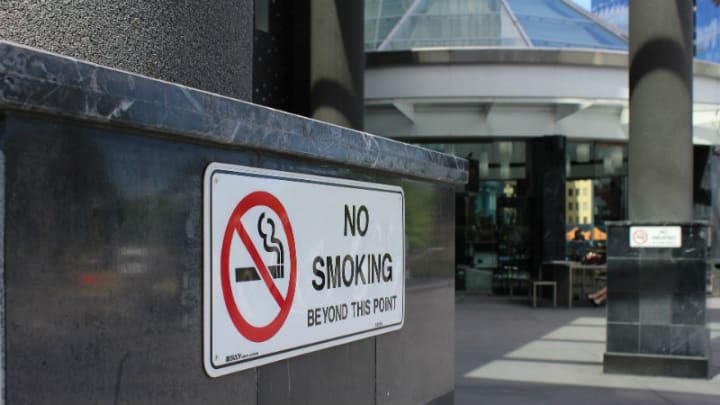
Tobacco use is a leading cause of preventable death. It kills more than 7 million people every year, a number that will increase without intensified action. This figure alone places tobacco control as a public health priority. But the social, environmental, and economic consequences of tobacco consumption truly make it a development issue: Today, around 80 percent of smokers live in developing countries.
The global economy loses $1.4 trillion every year due to tobacco use, according to a landmark monograph from the United States’ National Cancer Institute published last year. The damage to the environment occurs across the entire life cycle of tobacco products due to deforestation, water pollution from pesticide use, and cigarette littering. Premature deaths and disabilities caused by tobacco use have huge social impacts — particularly among lower-income communities members who are more likely to smoke.
The inclusion of a specific target on tobacco control in the 2030 Agenda for Sustainable Development has underlined the wider contributions that can be made to sustainable development at both a national and global level. Sustainable Development Goal Target 3.A calls for strengthened implementation of the World Health Organization Framework Convention on Tobacco Control — the first and only global public health treaty that represents the evidence-based response to the global tobacco epidemic. 180 countries, plus the European Union, are currently parties to the WHO FCTC, meaning the treaty covers more than 90 percent of the world’s population.
See more on tobacco control:
► What the WTO decision on plain packaging means for developing countries
► Opinion: How incentivizing small tobacco farmers can change livelihoods
► ILO strike disrupts board session, tobacco decision delayed again
Given the detrimental impact of tobacco on social, environmental, and economic development, effective WHO FCTC implementation should be recognized as a high-impact intervention that can accelerate progress across multiple SDGs. In fact, the WHO FCTC can positively contribute to the achievement of well over 50 SDG targets, according to an assessment published jointly by the secretariat of WHO FCTC and the United Nations Development Programme.
Here are three of the potential benefits.
1. Improving health outcomes
The WHO FCTC can support progress across SDG Goal 3 — good health and well-being. Tobacco use is a risk factor common to the four main groups of noncommunicable diseases: Heart disease and stroke, cancer, chronic respiratory diseases, and diabetes. This makes tobacco use one of the leading preventable causes of death in the world. Tobacco also contributes to communicable diseases, with more than 20 percent of global TB incidence attributable to smoking. Tobacco is known to worsen problems such as mental illness, HIV infection, and alcohol abuse. Accelerating the implementation of the WHO FCTC will support efforts to tackle these wider health challenges.
2. Poverty eradication
Reducing tobacco use will make a contribution to eradicating poverty, the greatest global challenge of the 2030 agenda. Besides the losses to national economies due to medical expenses and lost productivity — the full economic costs of tobacco to national economies are far greater than the revenues received from tobacco taxation — the treatment of tobacco-related illnesses can represent significant out-of-pocket expenditures for families. As tobacco use tends to be higher among less affluent people, these health costs can disproportionately affect poorer communities. In addition, if families are spending limited household resources on tobacco, that money is not available for food, health care or education.
3. Reducing negative environmental impacts
Implementation of the WHO FCTC reinforces climate action as well. Tobacco farming is more demanding on the environment compared to many food crops. Cultivating and curing tobacco leaves is a cause of global deforestation, with 200,000 hectares of natural woody biomass lost each year. That is mainly in developing countries, where 90 percent of tobacco farming takes place.
Growing tobacco is one of the most chemically intensive crops, and can cause pollution of nearby waterways. Implementation of Article 17 of the WHO FCTC — which requires the provision of support for economically viable alternative activities for tobacco growers — can help restore biodiversity and advance other important objectives such as food security. Brazil, for example, has had some success in supporting tobacco farmers who wish to move to other economically viable livelihoods, such as growing organic vegetables and banana farming.
International cooperation essential for impact
Since the provisions of the WHO FCTC go beyond the health field, good governance is essential for parties to meet the treaty’s general obligations. The development of comprehensive, multisectoral national tobacco control strategies, as well as the establishment of national coordinating mechanisms for implementation of the WHO FCTC, help countries to engage the whole government, civil society, and academics in effective tobacco control. As an international treaty supported by the binding obligation of developing domestic legislation, the treaty represents a way to strengthen the legislative and oversight capacities of lawmakers and parliamentarians with regard to development issues.
More on the FCTC 2030 project
Funded by the United Kingdom and Australia, the FCTC 2030 project supports parties to the WHO FCTC that are eligible to receive official development assistance to develop and implement government-wide tobacco control strategies, strengthen tobacco taxation, end tobacco advertising, introduce effective health warnings on tobacco packs, and introduce smoke-free work and public places.
In becoming parties to the WHO FCTC, governments have made a commitment to improving public health and development by implementing the provisions of the treaty. Nevertheless, many governments report that a lack of resources is one of the main barriers to progress. To address this challenge, the secretariat of the WHO FCTC, in collaboration with WHO and UNDP, has implemented an initiative to support low- and middle-income countries to achieve the SDGs by advancing implementation of the WHO FCTC — the FCTC 2030 project.
A blueprint for action
An acceleration in the implementation of the WHO FCTC is needed. Some parties to the WHO FCTC are still struggling to implement the most cost-effective measures such as raising taxation, banning marketing and advertising of tobacco, introducing effective health warnings, and making work and public places smoke free.
Mechanisms of assistance are already established and could be activated to support countries if more resources were available. Only 1 percent of global health funding is dedicated to preventing and treating NCDs in LMICs, where more than three-quarters of global NCD deaths occur.
It is time for development partners to recognize the full potential of the WHO FCTC to advance sustainable development. Tobacco is much more than just a public health issue.
Donors should consider investing in tobacco control, not only to promote better health, but to advance many areas of social, environmental, and economic development. Across the different sectors of government and the global development community, including finance, trade, and agriculture, the full implementation of the WHO FCTC will pay significant dividends for sustainable development.
The WHO FCTC sets out a blueprint for action. We now need the widest possible international cooperation to deliver an effective response to the global tobacco epidemic.
For more coverage of NCDs, visit the Taking the Pulse series here.






